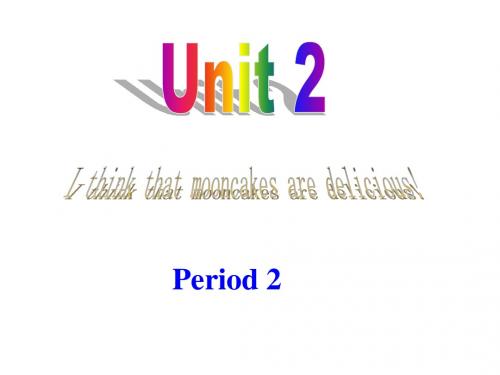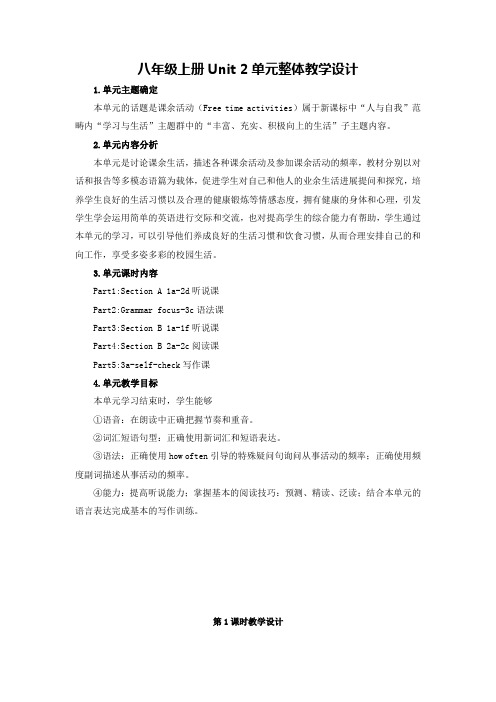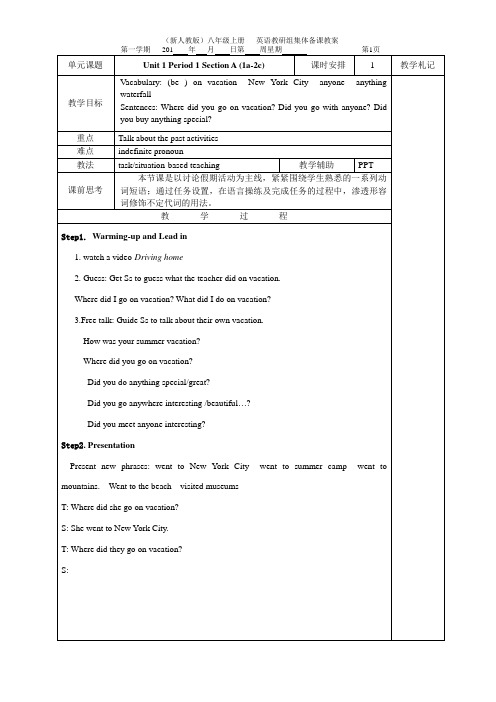人教版八年级上册英语Unit 3 Period 2
人教版八年级英语上册课件:Unit2 Period 2

On my visit to Australia, I feel Australians C are similar ______ us in many ways. A. with B. in C. to D. at — Can you tell the differences between these two pictures? — Differences? Oh, no. They look quite B ______. A. different B. similar C. strange D. interesting
在表示同一意义时,英语感叹既可用“what”引导, 也可用“how”引导。如: ① What a hot day it is! How hot the day is ! 多么热的天气呀! ② What tall buildings they are! How tall the buildings are! 多么高的楼房呀! ③ What bad weather it is! How bad the weather is! 多么糟糕的天气呀! ④ What bright sunshine it is! How bright the sunshine is! 多么明亮的阳光呀!
5. be similar to 跟 ... 类似的; 与 ... 同 样的
My problems are very similar to yours. 我的问题与你的差不多。 His dress is very similar to mine in colour. 他衣服的颜色和我衣服的很相似。 be similar to 的反义短语是be different from …(与……不同)
由“what”引导的感叹句:修饰名词(被强调部分), 单数可数名词前要加不定冠词a/an,复数可数名词或不可数名词 前不用冠词。句子的结构是:
人教pep版八年级英语上册Unit2单元教案

Unit 2How often do you exercise?Language Goal Talk about how often you do things:in this unit, students learn to 【语言目标】talk about what things they do and how often they do these things.KnowledgeGoals 【知识目标】Ability Goals 【能力目标】Moral Goals 【感情目标】Teaching Time 【课时】housework,hardly,ever,once twice,full ,maybe,least,junk, coffee,health, percent, online,Key Words although,through,mind,body,such,together,die,writer ,dentist,magazine,however,than,almost,less,pointhow often,on weekends,go to the movies,hardly Key Phrases ever,twice a week,three times a week,be goodfor ,at least,such as,less than,more thanKey Sentences 1. How often do you exercise?2.What do you usually do on weekends?1. The use of adverbs of frequency.Key Grammar 2.“ How often cause” of special questionsand answers.1. Through the learning to gain the ability to talk about howoften people do things.2.Write a report about how often people do things.1. Keep a diary every day.2.Do more exercise and develop good habits to keep healthy.Period 1Section A(1a-2d)Period 2Section A(Grammar Focus- 3c)Five periods Period 3Section B(1a-1e) Period 4Section B(2a- 2e)Period 5Section B (3a- Self Check)本单元的教课内容环绕“多久做一次运动”这一话题睁开。
八年级英语上册Unit 3练习题及答案 第二课时 Section A(2d-3c)(8张PPT)

Unit 1
6. also ,either, too的不同用法 7. enjoy doing sth. 喜欢做……;乐意做…… 8. It’s +形容词+(for sb. ) to do sth.
(对于某人来说)做某事…… 9. practice doing 练习做某事 10. decide to do sth. 决定做某事 11. look 词组的用法(如:look up, look for,
3. What ___ reading aloud to practice
pronunciation?
A. of B. about C. around D. for
4. Why don’t you ___ to tapes?
A. listening
B. listen
C. listened
D. to listen
1. 我过去常常怕狗。 I ____ ____ ____ afraid of dogs.
2. 她过去总是迟到吗? ____ she ____ ____ be late?
3. 他对互联网更感兴趣了。 He ____ ____ ____ ____ the Internet.
Keys: 1. to take notes 2. by listening to tapes 3. laugh at, in trouble 4. made a decision 5. take pride in / are proud of
Step 4 Task
Ways of learning Problems of
A. speak
B. spoken
C. speaking D. to speak
(新人教版)英语八年级上册 Unit 2 大单元教学设计

八年级上册Unit 2单元整体教学设计1.单元主题确定本单元的话题是课余活动(Free time activities)属于新课标中“人与自我”范畴内“学习与生活”主题群中的“丰富、充实、积极向上的生活”子主题内容。
2.单元内容分析本单元是讨论课余生活,描述各种课余活动及参加课余活动的频率,教材分别以对话和报告等多模态语篇为载体,促进学生对自己和他人的业余生活进展提问和探究,培养学生良好的生活习惯以及合理的健康锻炼等情感态度,拥有健康的身体和心理,引发学生学会运用简单的英语进行交际和交流,也对提高学生的综合能力有帮助,学生通过本单元的学习,可以引导他们养成良好的生活习惯和饮食习惯,从而合理安排自己的和向工作,享受多姿多彩的校园生活。
3.单元课时内容Part1:Section A 1a-2d听说课Part2:Grammar focus-3c语法课Part3:Section B 1a-1f听说课Part4:Section B 2a-2c阅读课Part5:3a-self-check写作课4.单元教学目标本单元学习结束时,学生能够①语音:在朗读中正确把握节奏和重音。
②词汇短语句型:正确使用新词汇和短语表达。
③语法:正确使用how often引导的特殊疑问句询问从事活动的频率;正确使用频度副词描述从事活动的频率。
④能力:提高听说能力;掌握基本的阅读技巧:预测、精读、泛读;结合本单元的语言表达完成基本的写作训练。
第1课时教学设计一、教学内容:Section A 1a-2d二、课型:听说课三、语篇研读What(主要内容):谈论课余简单的生活为主要话题,以对各类频度副词的学习和掌握,List(1a)看图列举周末活动;Listening(1b、2a、2b)主要是程涛正在讨论多久做这些活动,通过程涛的描述学习和理解频率的使用;Practice(1c、2c编对话关于周末有什么课余活动以及活动频率;Role-play(2d)Jack和Claire的对话,讨论下一周有哪些课余活动以及这些活动发生的频率,Claire丰富的课余生活。
新人教版八年级上册英语全册教案(51页) 全册

单元课题Unit 4 What’s the best movie theatre?语法归纳Unit 4教学札记形容词的比较级和最高级(二)1. 形容词的比较级和最高级的用法(1)形容词比较级用于两者(人或物)之间的比较,表示一方比另一方“更……”或“较……”,后面通常用比较连词than连接另一方所比较的人或物。
than引导的是比较状语从句,但为了避免重复,从句中有些与主句相同的部分常常省略,而把相比较的部分省略出来。
另外,在上下文明确时,形容词比较级也可以单独使用。
例如:This room is smaller than that one (is). 这个房间比那个房间小。
He is younger than I(am). 他年纪比我小。
His English is better than his brother 's (is). 他的英语比他哥哥的好。
1.形容词最高级用于三者或三者以上的人或事物之间的比较,表示其中一方在三者以上的人或事物中“最……”。
最高级前通常用定冠词the, 并用of或in短语来说明比较的范围。
Of后面一般接表示同类的名词,in接表示范围的名词。
例如:He is the tallest of all. 他是所有人中最高的。
Li Hua is the best student in his class. 李华是他班上最好的学生。
2.比较级与最高级的区别与联系(1)比较级是用来把彼此独立的适合人进行比较;最高级是把一个群体中的一员与整体进行比较,这个群体必须包括这个成员,请看下面例句:(A)Mary is taller than her two sisters. 玛丽比她的两个姐姐高。
(B)Mary is the tallest of the girls. 玛丽是这些女孩中最高的。
【注意】句(A)中玛丽是在另外两个姐妹之外,是玛丽一个人同另外两姐妹(作为一方)来比较,所以用比较级。
2019年秋人教版八年级上册英语课件:Unit 2 Section A 3a-3c(共31张PPT)

如:I will never forget this lesson. 我将永远忘不 了这一课。
We often go there.我们常去那儿.
Sometimes we go to the cinema and at other times we go for a walk.有时候我们去看电影, 有时候我们去散步。
Do you __e_a_t/_h_a_v_e_a__h_e_a_lt_h_y__b_r_e_a_k_fa_s_t_______ every day?
三、语法专练
( D ) 1. --I want to be an artist, but it __________ a little hard.
--Work hard, and __________ you’ll succeed (成功) at
—He never _go_e_s_______ shopping.
二、 根据中文提示完成句子,词数不限。 1. 有时Linda走路去上学。 __S_o_m__e_ti_m_e_s_ Linda _w_a_l_k_s_ to school. 2.我妹妹一周至少看二至三次电视。
My sister watches TV ______a_t_l_e_a_st__tw__o_______- or three times a week. 3.跑步友谊与我们的身体健康。 Running ___i_s_g_o_o_d__fo_r_____________ our health.. 4.你多久散步一次? ____H__o_w__o_ft_e_n________ do you____ta_k_e__a_______walk? 5.你每天吃健康的早餐了吗?
考点3专练 (选词填空)
人教新目标英语八年级上册Unit2全单元教学设计
人教新目标英语八年级上册Unit 2 How often do you exercise?Period 1 (1a-1c)教学目标:1. Knowledge objectsName of activities.Aderbs of frequency.What do you usually do on weekends?I often go to the movies.2. Ability objectsWriting skill.Listening skill.Communicative competence重点:Watching TV, reading, shopping Skateboarding, exercising难点:Always, usually, often, sometimes Hardly, ever, neverWhat does she do on weekends? She often goes to the movies.教学用具:A tape recorder. Large monthly calendar showing the days of the week.学习指导:Discover method. Listening and writing methods;Pairwork.教学设计:Step 1 . Lead in: (5 minutes)1. Listen to a song.2. Talk about your last weekend’s activities.Step 2 Presentation.(10 minutes)1. T:“What do you usually do on weekends ? ”S: I usually …… on weekends.2. Show the frequency words and read.always (100%) usually(80%) often (30-50%)sometimes (20%) hardly ever(5%) never (0%)3. Pair work: -- What do you do on weekends?--I …(Use the frequency words.)--What does she/he do on weekends?-- She/He ___________ _________________.Show some verb phrases: watch TV,read books,exercise,swim, play football、go shopping4. Learn the new language.A: How often does he do sports?B: He always…in the morning. He often… , but sometimes he … And he hardly ever … He never ...Step 3 . Work on 1a. (5 minutes)1. Look at the picture. Discuss with your partners. Make a list of the weekend activities.2. Let some Ss read out their activities. Let other Ss add more activities.Step 4 . Work on 1b.(5 minutes)1. Let a student read the words aloud. Make sure all the Ss know the meaning of the words.2. Tell Ss to listen and write the letters from the picture above on the line below.3. Play the tape for the first time. Ss listen and fill in the blanks.4. Play the tape for the second time for the Ss to check the answers.Step 5. Pair work. (10 minutes)1. Act out the conversation with a student.2. Let Ss talk about the pictures in 1a in pairs.3. Let some Ss act out their conversations.习题设计(10 minutes)Exercises:st summer vacation, we _____many photos when we had a trip to Dalian.A.takeB. takesC. tookD.will take2. –Mum,I’m hungry.Is there _____to eat?A. somethingB. nothingC. anythingD.everything3.After a long walk in the sun, they wanted to drink_______.A. cold somethingB. something coldC. nothing coldD. cold anything4.Did Lisa tell you______in the letter?A. funny anythingB. anything funnyC.funny somethingD. something funnyHomework教学反思时间教学课题Unit 2 How often do you exercise?Period 2 (2a-2d)教学目标:1.Words: Housework, hardly, ever, hardly ever, once, twice, Internet, program,full , swing, swing dance, maybe,2) Sentences--what do you usually do on weekends?--I always excersise.--How often do you go to the movies?--I go to the movies maybe once a month.3) Be able to understand the dialogues about how often people do things.教学重点:1. Master the words and target language;2.Master the sentence students structures “How often …?教学难点:To improve students’ listening skill and cooperative skill.学习指导:Discover method Listening and reading methods. Communicative qpproach.教学用具:A tape recorder. Some color paper for an activity.教学过程Step 1.Learn the new language.(5 minutes)Show the pictures and ask and answer: How often do you exercise?--Twice a week.Step 2. Work on 2a: (5 minutes)1. Let Ss read the phrases in the chart.2. Tell Ss that Cheng Tao is taking about how often he does these activities. Playthe recording for the first time. Ss listen and number the activities [1-5].3. Play the recording for the second time for the Ss to check the answers.Step 3.Work on 2b:(5 minutes)1. Tell Ss they will hear the recording again. This time, listen and match theactivities in 2a with how often Cheng Tao does them.2. Ss listen and math the activities with the phrases.3. Check the answers.Step 4. Pair work. (5 minutes)1. Ask one student how often he/she watch TV as a model.T: Hi, S1. How often do you watch TV? S1: I watch TV every day.T: What’s your favorite program? S1: Animal world.T: How often do you watch it? S1: Twice a week.2. Let one student read the activities in the chart. Tell them these new words:favorite website (最喜欢的网站);favorite sport (最喜欢的运动)3. Ss work with their partners. Then ask some pairs to act out their conversations. Step 5.Summarize.(5 minutes)Unit 2 How often do you exercise?What do you usually do on weekends?I usually go to the movies.She often goes to the movies .Twice a week.Step 6Work on 2d. (10 minutes)1. Lead in: Show some pictures and practice:A: What does she usually do? --B: She usually has piano lessons.A: How often does she have piano lessons? --B: She has piano lessons twice a week.2. show a video, and ask : What dance? –swing dance.Claire are having dance and piano lessons. Let’s listen to her and Jack’s conversation, listen and answer:3. Read the conversation and match the activity with the right time.4. Follow the tape and then Role-play the conversation.习题设计(10 minutes))汉译英:1.几乎从不____________2.至少,不少于________________3.一天一次________________4.一周两次___________________5.一个月三到四次________________6. 垃圾食品_________________7.喝牛奶___________________8.多于__________________9.最受欢迎的__________________10.保持健康_________________ Homework教学反思时间教学课题Unit 2 How often do you exercise?Period 3 (3a-3c)教学目标:1.Words and phrases:full, swing, swing dance, maybe, least, at least2.Target language:—How often do you /does he(she)….? —He usually…The use of the frequency words: always; usually ; often ; sometimes; hardly ever; never重点:Words and phrase难点:target language:教学用具: Tape recorder; Multi-Media;PPT学习指导:Task-based language teaching、create the language situation.教学设计:Step 1 Review: (5 minutes)1.Show a subject schedule, ask and answer:How often do you have _________ class? --We have _________class ____________.Step2 Grammar focus .(5 minutes)Let the students read the text. Invite some students to read the sentences in the boxand explain their Chinese meaning.为学生解释其中的语法点。
人教版英语八年级上册全册导学案(12页)
八年级上册英语导学案Unit1 Where did you go on vacation?Period 1 Section A (1a-2c)知识目标1. 口、笔头掌握以下句型-Where did you go on vacation? -I went to the mountains.-Where did Tina go on vacation? -She went to the mountains.-Did you go with anyone? -Yes, I went with my mother.2.熟练掌握以下词汇:vacation, mountain, special, anyone技能目标:复习并掌握动词一般过去式的构成规律; 能用一般过去式叙述假期所做的事。
通过对过去事情的谈论,增进同学的相互了解。
1. 你能用英语写出下列短语吗?呆在家里_________ 去纽约市_________ 拜访我的叔叔_________去夏令营_________ 去爬山_________ 去海滩_________参观博物馆_________ 买特别的东西_________ 遇见有趣的的人_________做有趣的事情_________II. 回忆并默写出规则动词过去式的变化规则:1.______________2. ______________3. ______________4. ______________III. 做调查,问问你的同伴上个暑假都去了哪儿?Before listening1. 小组内交流课前准备1中的短语,并大声朗读三遍2. 两人一组,用课前准备III的内容对话。
3. Do 1a.观察与复习:1a 中用的动词是______时态。
规则动词过去式的变化规则是:(课前准备II)______________________While listening1. 1b listen twice and number the people in the picture.2. 1c Pairwork. Make conversations about the people in the picture.3. 2a Listen twice and complete the chart.4. 2b Listen twice again and check Yes or No for each question.5. 模仿秀:听录音中的重点句段,反复跟读,模仿语音语调。
八年级上册Unit 3 I’m more outgoing than my sister. (Section A Period1)教学案例分析案例分析
新目标英语八年级上册Un i t 3 I’m m or e ou t go i n g t h an m y s i s t er.(S e ct i on A P eri od1)教学案例分析汉南区育才中学张小艳[设计理念]以任务为中心的任务型语言教学是目前交际教学思想中的一种新的发展形态。
它倡导“在做中学,在做中用”的教育理念,将语言应用的基本理念转化为具有实践意义的课堂教学方式。
运用学习任务组织教学,强化了语言实践的过程,充分体现了语言的交际本质。
“新目标英语”是一套好教材,然而,在我们的英语课堂上,实施任务和开展活动具有很大的挑战性,需要在实际操作中对教材进行重新整合,并要根据学生的环境和接受能力来开展行之有效的任务和活动。
同时利用多媒体和网络技术,帮助解决教学难题。
这样,既能为学生创设真实可视的英语学习环境,也能激发学生积极参与的欲望,引起学生的共鸣和兴趣。
[教材分析]教学内容为新目标英语八年级上册第三单元Section A (1a-1c) 。
教学重点:1.学习有关人物特点的单词: hard-working, outgoing, quiet, funny, serious, athletic2.学习人物比较的重要句型:(1)Tina is taller than Tara.(2)Sam has longer hair than Tom.教学难点:掌握语法点:the comparative degrees of adjectives and adverbs[教学目标]1.知识目标(1) New words:hard-working, outgoing, quiet, funny, serious,athletic(2) Target language:Tina is taller than Tara.2.能力目标(1) 通过师生对话,生生对话等一系列活动,提高学生实际运用英语的能力。
(2) 体会合作学习所带来的快乐。
高中英语(新人教版选修8)教学课件:Unit 3 Period Ⅱ课件
菜单
新课标 ·英语 选修8
教 学
④你回家时能顺便探望一下奶奶吗?
目
标
Could you Grandma on your way home?
分
析
【答案】 ①call you up ②calls up memories of
课
堂
③was called off ④call in on
互 动
探
教
究
学
方
案
设
标
分 blood voluntarily.政府号召青年义务献血。
析
He is ill;you should call in the doctor right away.
课 堂
互
他病了,你应该立即请大夫来。
动
探
教
究
学
方
案
设
计
菜单
新课标 ·英语 选修8
教
学
完成句子
目
标 分
①我昨晚给你打电话,但没人接。
菜单
新课标 ·英语 选修8
教
(3)通过对这些词汇的学习能够更深层次的理解课文,
学
目 并通过课文加深对这些词汇的理解,更加熟练的运用这些
标
分 析
词汇。
课
(4)通过对本课文的理解,让学生学会用英语写求职信
堂 互
类的文章,并培养学生养成自觉用英语写作的好习惯,以
动 探
教
究
学 提高学生的书面表达能力。
方
案
I'd like to go to the cinema now and then. 我喜欢偶尔去看电影。
菜单
新课标 ·英语 选修8
- 1、下载文档前请自行甄别文档内容的完整性,平台不提供额外的编辑、内容补充、找答案等附加服务。
- 2、"仅部分预览"的文档,不可在线预览部分如存在完整性等问题,可反馈申请退款(可完整预览的文档不适用该条件!)。
- 3、如文档侵犯您的权益,请联系客服反馈,我们会尽快为您处理(人工客服工作时间:9:00-18:30)。
II. Write a proper word in the blank according to the meaning of each sentence.(根据句意,写出相 应的单词。)(10%)
tall 1. Maria isn’t short. She is____________. outgoing 2. My brother is quiet, but I’m_____________.
both of --Both of the books are interesting. = The books are both interesting. My parents are both teachers. = Both of my parents are teachers. My parents both like reading. = Both of my parents like reading.
3. Zhang Hong likes eating all the time. He is ____________. fat
friendly 4. The boy talks to everyone. He is___________.
smart 5. My son studies very well. He is ___________. funny 6. My friend makes us laugh. She is __________. athletic 7. We play basketball every day. We are _________. calm 8. I don’t like talking a lot. I’m ________ and quiet.
Can you find out the differences between them?
Cai Zhuoyan is taller than Zhong Xingtong. She is more outgoing than Zhong Xingtong. Zhong Xingtong is shier than Cai Zhuoyan.
both
1e both teachers.
2.我的父母都喜欢阅读。
My parents both like reading.
3.在马路的两边有很多的商店。 There are many shops on both sides of the road.
Can you find out the same between them?
They are both cute and beautiful. They are both good at sports. They are both good at schoolwork. They are both popular in school. They both make us laugh. They both have cool clothes. They like to do the same things.
My father dances well. My mother dances well, too.
= My _______ _____dance well. parents both _____ Both of my _______dance well. parents _____ = ____ ____
long 9. Tom doesn’t have short hair. He has __________ ha
Fill in the blanks 1.This bike is newer 2.The book is too it . 3.My shirt is
(new)than that one. (boring),I don’t like reading (cheap) than yours. more interesting nice (interesting)
both A and B My parents are both teachers. = Both my father and my mother are teachers. Lily and Lucy both come from America.
= Both Lily and Lucy come from America.
(thin) than my sister.
(popular) than Tom.
more popular
He is 15 years old. She is 12 years old. a little older = He is ____ ____ ____ than her. a little younger = She is ____ _____ _____ than him. three _____ _____ = He is _____ years older than her. a little, much, a lot, even, far 经常修饰比较级。 Your mother is much younger than mine.
I’m feeling even worse.
Taking a plane is far more enjoyable.
This dress is much more cheaper than that one. (改错)
Zhong Xingtong. Twins
Cai Zhuoyan
The singers are not twin sisters but good friends.
boring
cheaper
4.I think swimming is than running.
5.The backpack is very 7.I’m a little thinner
8.Mary is
(nice).
(well) than Lisa.
6.Eliza speaks English better
